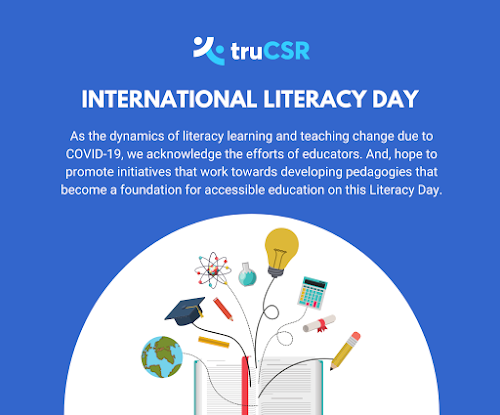International Literacy Day | Significance, Global Crisis and the Role of Non-Profits in Education | truCSR
Written by: Rebecca Shibu
Edited by: Yamini Peter
Our team wishes everyone a very Happy International Literacy Day. Reading, writing and comprehending become a crucial foundation of education. To say the least, literacy is a tool for accessible and quality education. A medium with which expression and ideas can be documented and communicated effectively. The Right to Education has been a prominent goal for several organizations in the social sector. With their capacity and expertise, they have time and again brought people to understand what it means to be literate and educated.
UNESCO's declaration in 1966 led to September 8th being celebrated as the International Literacy Day. The day brings to life the importance of literacy for an individual and communities across the world. As a practice, the United Nations gives a theme to the day. Given an ongoing pandemic, the theme for the year is 'Literacy Teaching and Learning in the COVID-19 crisis and beyond'. The pandemic, this year, has come with a multitude of obstacles for the world to tackle. Be it within the scope of healthcare, livelihood generation or education. In keeping up with the developments since March 2020, the social sector has worked towards developing initiatives that help the communities safeguard themselves and their fundamental rights.
As noted by the World Literacy Foundation, over 190 countries had to shut down which significantly affected the education of around 1.27 billion children and youth. With the sudden shift from offline to online education, there is much to cope with for many educators and their pedagogies. This year's focus remains on the changing pedagogies that requires collaboration and support by the government and the people. The marginalized communities and persons bear the brunt of the changes due to lack of agency and a generational cycle of socio-economic and cultural backwardness. The digital divide, again, becomes the factor of further marginalization of the less fortunate. Hence, the not-for-profit organizations come at the forefront of the implementation of initiatives that are tailored to benefit the underprivileged sections of society.
The ongoing global crisis has urged us to revisit the entire education system, one must be thinking of the widening gap between people with and without access to education. As positive educational interventions have become the need of the hour, tailoring initiatives that address gaps and help the less privileged, specifically during a pandemic is necessary. As we believe in the power of holistic growth, it takes organizations to pitch in for this growth. Not-for-profit organizations have been reaching out to people in their capacity who often remain left out. With the National Education Policy 2020 in the country, the aim is to make quality education accessible to all people regardless of their socio-economic backgrounds.
We take this opportunity to share three different projects by implementers who have been driven to work in the sector of education for children. Through our platform, we aim to facilitate engagement/partnership with the contributors working in the area of Education.
- Akshara Foundation for Arts and Learning, a foundation based out of Mumbai, Maharashtra aims to support 30 underprivileged children enrolled in Akshara High School. Given the drastic impact of the pandemic, they intend to enable a thorough learning experience for the children by adapting to the needs of the hour. Building a community where children absorb knowledge, develop skills and express themselves freely without fear, thus empowering them, has been the foundation's goal.
- Zep Rehabilitation Centre, a non-profit rehabilitation centre in Pimpri-Chinchwad area, that works with special children running with Mental Retardation, Developmental Delays, Genetic Disorders, Down Syndrome, Autism, Cerebral Palsy and Pervasive Developmental Disorders. Due to COVID-19, the ecosystem of consistency in education has been ruptured. Through their project, they intend to bring the best of care and education to the children. Furthermore, the project focuses on the need to reinstate the development process and routine for the children.
- Light of Life Trust, an NGO in Mumbai, Maharashtra which was established in 2002 to transform the lives of the underprivileged and rural communities. Through their Program Anando they aim to educate, empower and equip for employment students. To break the generational cycle of poverty and introduce concepts of financial independence and wellbeing, Anandi Program helps children through providing quality education and lay down the foundation for an independent future. The program focuses on five centres across Maharashtra with over 300 children as their primary beneficiaries.




Comments
Post a Comment